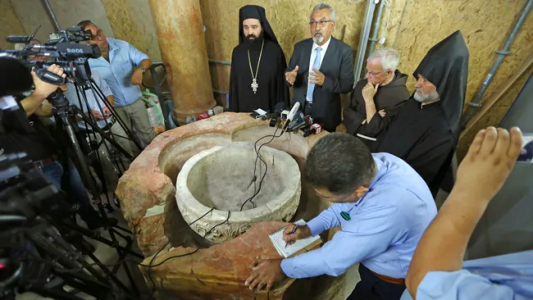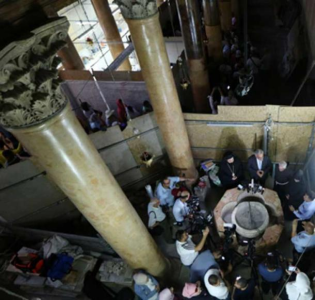FromThayer:
From Strong's:
so your not going to show me baptize in any of the other passages. and just try to mock me?
The children of Israel were baptized into moses.
They were placed into Moses. Moses being the head
the following is taken from weist.. word studies in the greek new testament..
Baptise, baptism, these two words are not native to the english language, therefore do not have any intrinsic meaning of their own. The only rightfull meaning they can have is the one derived from the greek word of which they are the spelling. The verb is spelled Baptizo, from which a slight change in spelling we get our worde baptize, the noun is baptisma, and taking off the last letter we have baptism.
we will study these words first in their classic usage. The word baptizo is related to another greek word bapto. the latter meant to dip, dip under. it was used of the smith tempering the red hot steel. it was also used of the sense of to dip in die, to colour or steep. it was used in the act of dieing the hair, and of glazing earthen vessels. it was used as a proverb in the sense of "steeping someone in crimson". that is giving him a bloddy caxcomb. It meant also to fill by dipping in, to draw. It was used of a ship that dipped, that is sank. Baptiso the related word meant to dip repeatedly. it was used of the act of sinking ships. it meant also to bathe. it was used in the phrase soaked in wine. where the word soaked, is the meaning of baptizo. it is found in the phrase overhead and ears in debt, where the word overhead and ears, are the graphic nature of what the word meant. the word here therefor means completely submerged. our present day english equivilent would be sunk. A baptes is one who dips or dyes. a baptisis is a dipping, bathing, a washing, a drawing of water. A baptisma is that which is dipped, a baptisteron is a bathing place, a baptistes is one that dips, a dyer, baptos means dipped, dyed. bright colored, drawn like water.
Baptizo is used in the 9th book of the odyssey, where the hissing of the burning eye of the cyclops is compaired to the sound of water where the smith dips ( baptizo) a piece of iron, tempering it. , in the battle of frogs and mice, it is said that a mouse thrust a frog with a reed, and the frogged leaped over the water, dying ( baptizo ) the weater with blood. Euripides uses the word as a ship which goes down in the water and does not come back to the surface. Lucian dreams that he has seen a huge bird shot with a mighty arrow, and as it flies high in the air, it dies ( baptizo) the earth with his blood. in Xenophon's Anabasis, we have the instance where the Greek soldiers placed ( baptizo) the points of their spears in a bowl of blood.
We come now to the usage of these words in the koine greek, giving examples from the papyri, the LXX, and the new testament.
In secular documents of the koine period, moulton and Milligan report the following uses of baptise.. A submerged boat, ceremonial ablusions, a person flooded or overwhelmed in calamities. they say that the word was used in its metaphorical sense even among the uneducated of people. . A biblical example of this is found in our Lords speaking of his passion as a baptism ( matt 10: 38), these scholars report the use of bapto as referring to fullers and dyers. the word is used of colored garments, and of wool to be dyed. the word baptisma is found in a question regaurding a new baptism someone is reported to be preaching. This use of the noun is peculiar to the N.T. and to ecclesiastical writers.
In the LXX we have in leviticus 4: 6 the words, and the priest shall dip ( bapto) his finger in the blood, and sprinkle (prosraino) of the blood seven times before the Lord. Here the word Bapto is found juxtaposition to prostriano, a verb closely allied with prozrantizo, baptiso meaning to dip, the latter verb to sprinkle
In the NT we have the rich man asking that lazerus dip ( bapto) his finger in water and cool his tongue. ( luke 16: 24 ). In Heb 9: 10, Baptisma is translated washings and refers to the ceremonial ablusions of Judaism. In Mark 7: 4 Baptisma is used of the ceremonial washings of cups, pots, brazen vessels and tables, Baptisma is used in Matt 3: 7 and baptizo in matt 3: 16 and 1 cor 14 of the rite of water baptism. In Mark 10: 38 our Lord speaks of his sufferings on the cross as the baptisma with which he is to be baptizo.
In these examples we see various uses of the words bapto and baptizo we discover three distinct usages, a mechanical, a ceremonial and a metaphoricle one.
The mechanical usage can be illustrated by the action of the smith dipping the hot iron in water, tempering it, or the dyer dipping the cloth in the dye for the purpose of dying it. these instances of the use of our greek word, give us the following defenition of the word in its mechanical usage. the word refers to the introduction or placing of a person or thing into a new environment or into union with something else, as to alter its condition or its relationship to its previous environment or condition. While the word, we found, had other uses, yet the one that predominated above the others was the mechanical one. Observe how perfectly the meaning is in accord with the usage of the word in rom 6: 3- 4. where the believing sinner is baptized into vital union with Jesus Christ. The believing sinner is introduced or placed in Christ, thus comming into union with him. By that action, he is taken out of his old environment and condition in which he had lived, the first adam, and is placed into a new environment and condition, the last Adam. By this action his condition is changed from that of a lost sinner with a totally depraved nature to that of a saint with a devine nature. His relationship to the law of God is changed from that of a guilty sinner to that of a justified saint. All this is accomplish with the act of the Holy Spirit introducing, or placing us into vital union with Jesus Christ. No ceremony of water baptism ever did that! The entire context is supernatural in its character. The greek word here should not be transliterated but translated. The translation should read; " as many were introduced (placed ) into Christ jesus, into his death were introduced. therefore we were buried with him through the aformentioned introduction into his death. The same holds true for 1 cor 12: 13; which should be translated " for through the instrumentality of one spirit, we were all placed into one body." It is because we so often associate the english word "baptism" with the rite of water baptism, that we read that ceremony into Romans 6. A student is one of the writer's greek classes who is a greek himself, who learned to speak that language as his mother tongue and studied it in the schools of greece, stated during a class discussion that the greek reader would react to the Greek Text of Romans and the word baptizo as the writer has.



